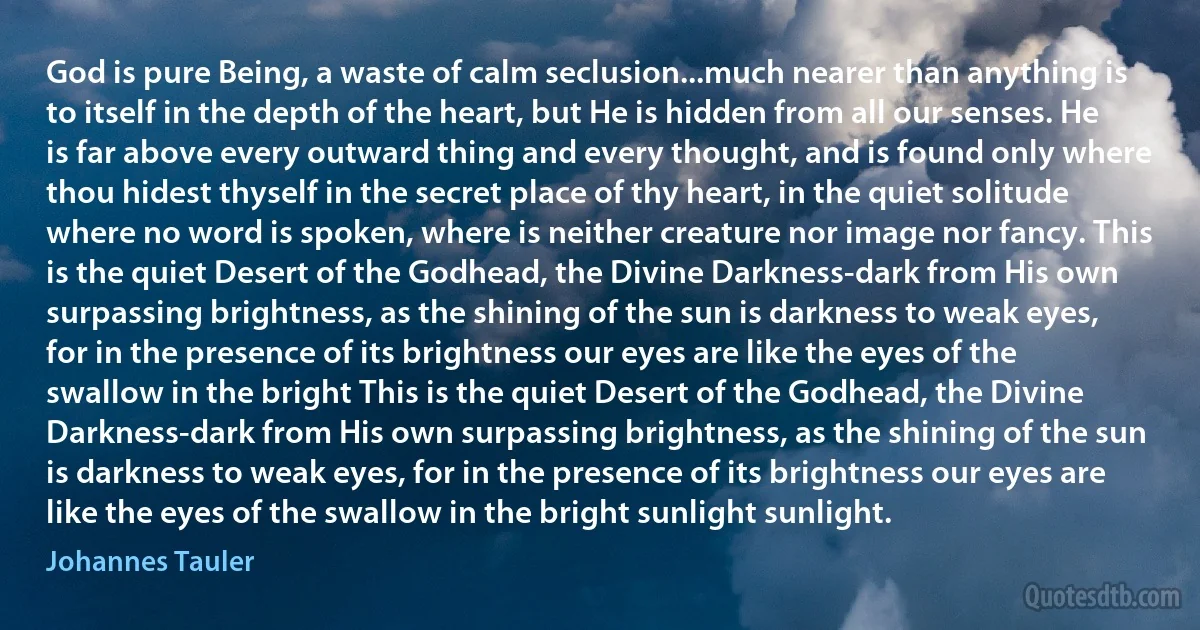
God is pure Being, a waste of calm seclusion...much nearer than anything is to itself in the depth of the heart, but He is hidden from all our senses. He is far above every outward thing and every thought, and is found only where thou hidest thyself in the secret place of thy heart, in the quiet solitude where no word is spoken, where is neither creature nor image nor fancy. This is the quiet Desert of the Godhead, the Divine Darkness-dark from His own surpassing brightness, as the shining of the sun is darkness to weak eyes, for in the presence of its brightness our eyes are like the eyes of the swallow in the bright This is the quiet Desert of the Godhead, the Divine Darkness-dark from His own surpassing brightness, as the shining of the sun is darkness to weak eyes, for in the presence of its brightness our eyes are like the eyes of the swallow in the bright sunlight sunlight.
Johannes TaulerRelated topics
above anything bright calm darkness depth desert divine fancy far found godhead heart hide nor place presence pure quiet seclusion secret shining speak sun surpassing swallow thing thought thou waste word eyesRelated quotes
Why should we put up with the present evils in our society? As opposed to the society we are visualizing, the present one can be described as a diseased one. The evils are there on all levels, international and national, and even within the smaller units such as towns and families. Of course, the disease did not appear like a bolt from the blue, either yesterday, or last year. It is the result of factors that have deep roots and long lives. These consist of privations, discriminations oppressions, bigotries, hatreds, and hostilities; poverty, ignorance, hunger, and illiteracy. Each and all of these have been left to us as ar evil heritage from the past. The fundamental difference between our situation today and that of our forefathers is that now knowledge has enabled us to realize that these evils are neither natural nor inevitable in the same way as we have found that cholera or the bubonic plague are not necessary calamities.

Muhammad Reza Pahlavi
The Qur'an is not a book of abstract theories and cold ideas, which one can grasp while seated in a cozy armchair. Nor is it merely a religious book like other religious books, whose meanings can be grasped in seminaries and oratories. On the contrary, it is a Book which contains a message, an invitation, which generates a movement. The moment it began to be sent down, it impelled a quiet and pious man to abandon his life of solitude and confront the world that was living in rebellion against Allah. It inspired him to raise his voice against falsehood, and pitted him in a grim struggle against the lords of disbelief, evil and iniquity. One after the other, from every home, it drew every pure and noble soul, and gathered them under the banner of truth. In every part of the country, it made all the mischievous and the corrupt to rise and wage war against the bearers of the truth.

Abul Ala Maududi
A filmed play like this doesn't offer the sensual enjoyment that movies can offer, but you don't go to it for that; you go for O'Neill's crude, prosaic virtuosity, which is also pure American poetry, and for the kind of cast that rarely gathers for a stage production. [...] Larry, a self-hating alcoholic, is a weak man and a windbag, but Ryan brings so much understanding to Larry's weakness that the play achieves new dimensions. Ryan becomes O'Neill for us; he has O'Neill's famous "tragic handsomeness" and at the end, when Larry is permanently "iced" - that is, stripped of illusion - we can see that this is the author's fantasy of himself [...] Fredric March interprets Harry Hope with so much quiet tenderness that when Harry regains his illusions and we see March's muscles tone up, we don't know whether to smile for the character or the actor.

Pauline Kael
Or indeed we may say again, it is in what I called Portrait-painting, delineating of men and things, especially of men, that Shakspeare is great. All the greatness of the man comes out decisively here. It is unexampled, I think, that calm creative perspicacity of Shakspeare. The thing he looks at reveals not this or that face of it, but its inmost heart and generic secret: it dissolves itself as in light before him, so that he discerns the perfect structure of it. Creative, we said: poetic creation, what is this too but seeing the thing sufficiently? The word that will describe the thing, follows of itself from such clear intense sight of the thing. And is not Shakspeare's morality, his valour, candour, tolerance, truthfulness; his whole victorious strength and greatness, which can triumph over such obstructions, visible there too? Great as the world!

Thomas Carlyle
Were we required to characterise this age of ours by any single epithet, we should be tempted to call it, not an Heroical, Devotional, Philosophical, or Moral Age, but, above all others, the Mechanical Age. It is the Age of Machinery, in every outward and inward sense of that word; the age which, with its whole undivided might, forwards, teaches and practises the great art of adapting means to ends. Nothing is now done directly, or by hand; all is by rule and calculated contrivance. For the simplest operation, some helps and accompaniments, some cunning abbreviating process is in readiness. Our old modes of exertion are all discredited, and thrown aside. On every hand, the living artisan is driven from his workshop, to make room for a speedier, inanimate one. The shuttle drops from the fingers of the weaver, and falls into iron fingers that ply it faster.

Thomas Carlyle
